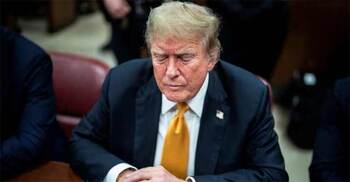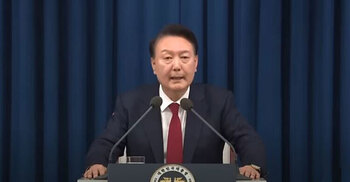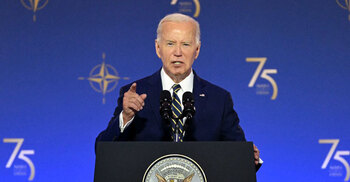Iran never plotted to kill Trump: Pezeshkian

Iran “never” plotted to assassinate Donald Trump during last year’s US election campaign and never will in the future, President Masoud Pezeshkian told NBC News’ Lester Holt in an exclusive interview in Tehran.
Asked about the reported plot against Trump outlined by US authorities, Pezeshkian said: “This is another one of those schemes that Israel and other countries are designing to promote Iranophobia. ... Iran has never attempted to nor does it plan to assassinate anyone. At least as far as I know.”
Holt then asked Pezeshkian: “You’re saying there was never an Iranian plot to kill Donald Trump?”
“None whatsoever,” Pezeshkian replied.
Asked whether Iran is willing to promise that there will be no attempt on Trump’s life, Pezeshkian said, “We have never attempted this to begin with, and we never will.”
The interview is Pezeshkian’s first with foreign media since the U.S. presidential election. It was conducted with a government interpreter present and translating in real time. NBC News reviewed the translation independently, and where there are discrepancies this article relies on the independent translation.
In November, the Justice Department charged an Iranian man in an alleged murder-for-hire effort to kill Trump when he was the Republican presidential candidate. Two others were charged for allegedly planning to kill an Iranian American journalist and activist who has criticized the Iranian government over its treatment of women.
US authorities said the plot was part of Iran’s efforts to avenge the death of a top Iranian general, Qasem Soleimani, who was killed in Baghdad in a U.S. drone strike Trump ordered during his first term in office.
In mid-October of last year, Iran sent a written message via Swiss diplomats saying that it would not seek to kill Trump, according to a U.S. official, NBC News has reported.
US and European governments say Iran for years has sought to silence Iranians abroad who have criticized the regime.
The United Kingdom last year summoned Iran’s top diplomat in London after Tehran targeted Iranian journalists based in Britain for intimidation. One journalist was stabbed in the leg in an attack blamed on Iran. Tehran denies the accusations.
Past tensions with Trump
During Trump’s first term in office, tensions between the United States and Iran spiked. In 2018, Trump withdrew the United States from the 2015 nuclear deal between Iran and world powers that limited the country’s nuclear program in return for an easing of U.S. economic sanctions.
Trump reimposed the sanctions and introduced additional punitive measures. The Biden administration then held indirect talks with Iran to try to revive the 2015 nuclear deal, but the discussions failed to produce an agreement.
Pezeshkian, who has portrayed himself as a relative moderate, said Iran in principle is open to dialogue with the second Trump administration. But he said that the United States has not lived up to its commitments in the past and that it has sought to topple the Iranian government.
“The problem we have is not in dialogue," Pezeshkian said. "It’s in the commitments that arise from talk and dialogue that we’ll have to commit to.”
When Iran held talks with major powers about its nuclear program, “we upheld all the commitments that we had to commit to,” he said. “But unfortunately it was the other party that did not live up to its promises and obligations.”
He added, “We have this doubt that, no matter how much we engage in conversation and dialogue, they are trying to topple the government, not solve the problems.”
Since Trump withdrew from the nuclear deal in 2018, Iran has ignored its provisions, blocked some UN inspections and made advances in its uranium enrichment work. According to US officials, Iran has dramatically increased its stockpile of enriched uranium and most likely has enough fissile material to make more than a dozen nuclear weapons if it decided to build an atomic arsenal.
Trump’s return to the White House and Iran’s advancing nuclear program have prompted speculation that the United States and Israel might take military action to prevent Iran from building a nuclear bomb.
Pezeshkian said Iran is not seeking war but would be ready to defend itself if its nuclear sites came under attack.
“You see, naturally enough, we will react to any action. We do not fear war, but we do not seek it,” he said, adding: “I solemnly hope that this will not transpire because it will be to the detriment of all the actors, not only and merely us.”
Pezeshkian said Iran’s adversaries were accusing Tehran of trying to build the bomb “to fabricate some sort of a pretext.”
But he added, “This is not true.”




